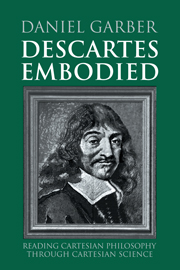Book contents
- Frontmatter
- Contents
- Acknowledgments
- Abbreviations, Citations, and Translations
- Introduction
- Part I Historiographical Preliminaries
- Part II Method, Order, and Certainty
- 2 Descartes and Method in 1637
- 3 A Point of Order: Analysis, Synthesis, and Descartes' Principles (with Lesley Cohen)
- 4 J.-B. Morin and the Second Objections
- 5 Descartes and Experiment in the Discourse and Essays
- 6 Descartes on Knowledge and Certainty: From the Discours to the Principia
- Part III Mind, Body, and the Laws of Nature
- Part IV Larger Visions
- Sources
- Index
2 - Descartes and Method in 1637
Published online by Cambridge University Press: 10 November 2009
- Frontmatter
- Contents
- Acknowledgments
- Abbreviations, Citations, and Translations
- Introduction
- Part I Historiographical Preliminaries
- Part II Method, Order, and Certainty
- 2 Descartes and Method in 1637
- 3 A Point of Order: Analysis, Synthesis, and Descartes' Principles (with Lesley Cohen)
- 4 J.-B. Morin and the Second Objections
- 5 Descartes and Experiment in the Discourse and Essays
- 6 Descartes on Knowledge and Certainty: From the Discours to the Principia
- Part III Mind, Body, and the Laws of Nature
- Part IV Larger Visions
- Sources
- Index
Summary
The Discourse on the Method and the three essays that were published with it, the Dioptrics, the Meteors, and the Geometry, make up a very curious book. The very title page emphasizes the preliminary discourse, and that discourse, the Discourse on the Method, emphasizes method, the importance that method had for Descartes in making the discoveries he made, the importance that the method Descartes claims to have found will have for the progress of the sciences and for the benefit of humankind as a whole. Descartes is not, of course, telling us that we are obligated to follow his method; the Discourse is, after all, proposed “as a story, or, if you prefer, as a fable” (AT VI 4). But Descartes expects that we will all see the light, the light of reason, of course, and follow his example. It is curious, then, that Descartes gives the reader only brief hints of what that method is, four brief, vague, and unimpressive rules that, taken by themselves, would hardly seem to justify Descartes' enthusiasm, not to mention a whole discourse in their honor. Furthermore, explicit methodological concerns are hardly in evidence in the Dioptrics, the Meteors, and the Geometry, which are, Descartes claims, “essays in this method,” as he identifies them on his title page. Indeed, one is hard pressed to find much evidence of the method at all after 1637, either explicit discussions of the method or explicit applications of the method in any of Descartes' writings, published or unpublished. Very curious.
These observations raise quite a number of questions about the development of Descartes' thought and the state of his program as of 1637.
- Type
- Chapter
- Information
- Descartes EmbodiedReading Cartesian Philosophy through Cartesian Science, pp. 33 - 51Publisher: Cambridge University PressPrint publication year: 2000
- 5
- Cited by



